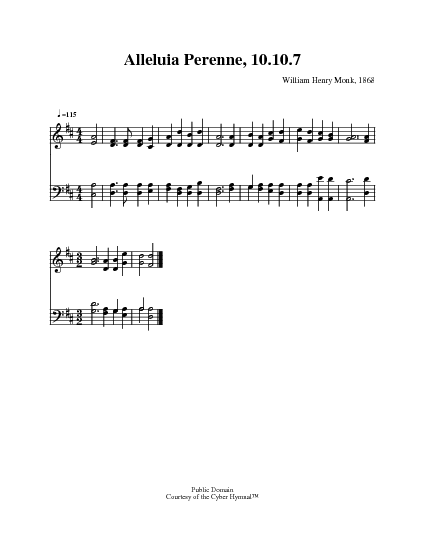Alleluia piis edite laudibus. This anonymous hymn, Mone, 1853, i. p. 87, assigns to the 5th century, on the ground that it was included in the Mozarabic Breviary, in which no hymns were admitted which arc of later date than the 8th century, and that the shortened strophe indicated that date. He gives the text from a Munich manuscript of the 10th century, and adds numerous readings and a few notes.
The text is also in the Hymnarium Sarisburiense, London, 1851, pp. 60,61, where it is given as the hymn at Matins on Septuagesima Sunday and through the week, and as from a manuscript (date 1064), formerly belonging to Worcester Cathedral; which manuscript professes to contain Ambrosian Hymns for the different Hours, according to the Constitutions of our Father Benedict, and to have St. Oswald as its compiler. [Rev. W. A. Shoults, M. A.]
Translations in common use:—
3. Sing Alleluia forth in duteous praise. By J. Ellerton. First published, with an explanatory and historical note, in The Churchman's Family Magazine, 1865. In 1868 it was embodied in the Rev. R. Brown-Borthwick's Supplemental Hymn and Tune Book, and again, after revision by the translator, in the Appendix to Hymns Ancient & Modern the same year. It was revised a second time for Church Hymns, 1871, and has also been printed elsewhere with the alteration of a word or two, but usually with the translator's consent. Original translation as above; authorised translation in Church Hymns Since its publication in Hymns Ancient & Modern, 1868, it has been included in almost every hymnal of note in Great Britain, and most English-speaking countries. It is the most vigorous, musical, and popular rendering of the "Alleluia piis edite" which we possess.
-- Excerpts from John Julian, Dictionary of Hymnology (1907)


 My Starred Hymns
My Starred Hymns




